Have you ever wondered whether you should use to or for? If that’s the case, then this article is for you. From the most beginner’s concepts to more advanced explanations and examples. Remember you can also download it in PDF.
What you will find in this guide:
- 1. Starting with the basics
- 2. When should you use “TO”?
- 3. When should you use “FOR”?
- 4. Confusing cases
- 5. Practice exercises with solutions

1. Difference between TO and For – Let’s start with the basics…
To become an effective communicator, your grammar doesn’t have to be perfect. However, some mistakes can lead to misunderstandings. If you are not sure about when to use TO or FOR, follow these three basic rules:
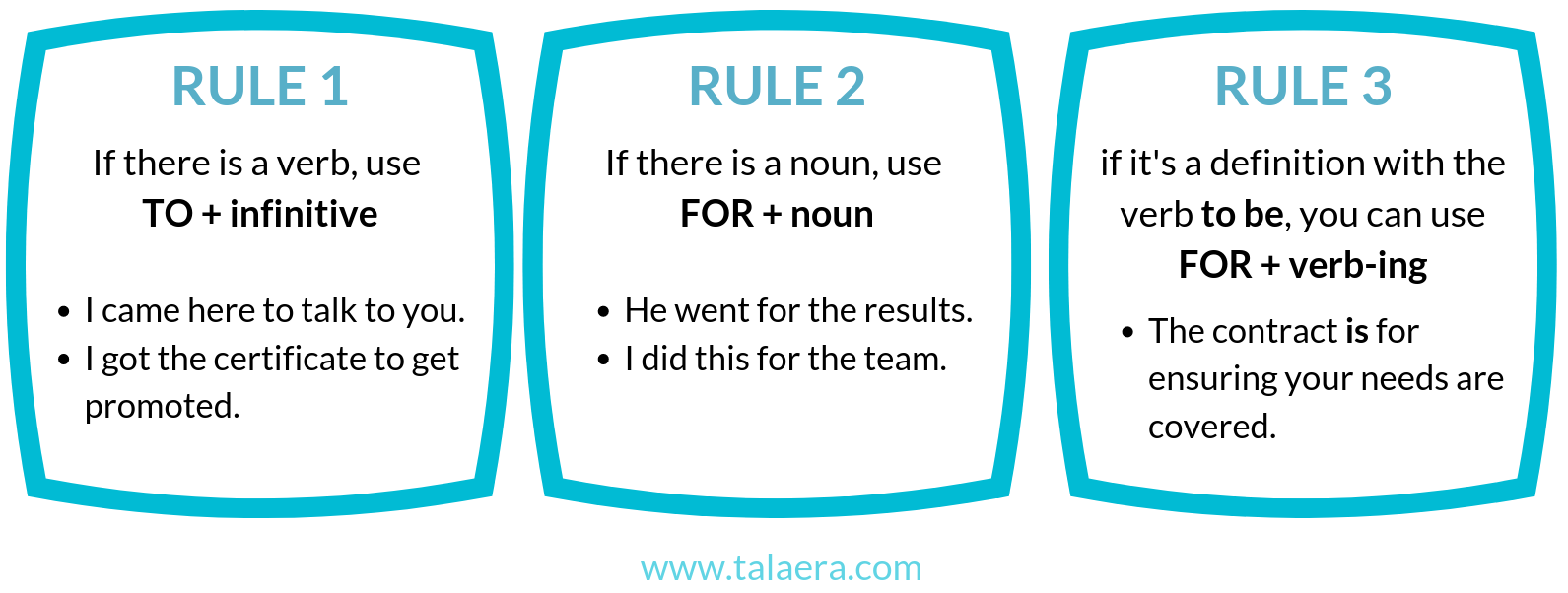
Rule 1: if there is a verb, use TO + infinitive
- I came here to talk to you.
- I study every day to improve my English.
Rule 2: if there is a noun, use FOR
- He came for the results.
- I did this for the team.
Rule 3: for definitions with the verb “to be”, you can use FOR + verb-ing
- The contract is for ensuring your needs are covered.
- The security guards are for keeping the area safe.
Extra Rule: with verbs, you can use FOR + verb-ing, but if you can replace it with TO + infinitive, do it!
- Use the template for writing a perfect email. (OK) → Use the template to write a perfect email. (better)
- This tool is used for debugging the system. (OK) → This tool is used to debug the system. (better)
2. When should you use “TO”?
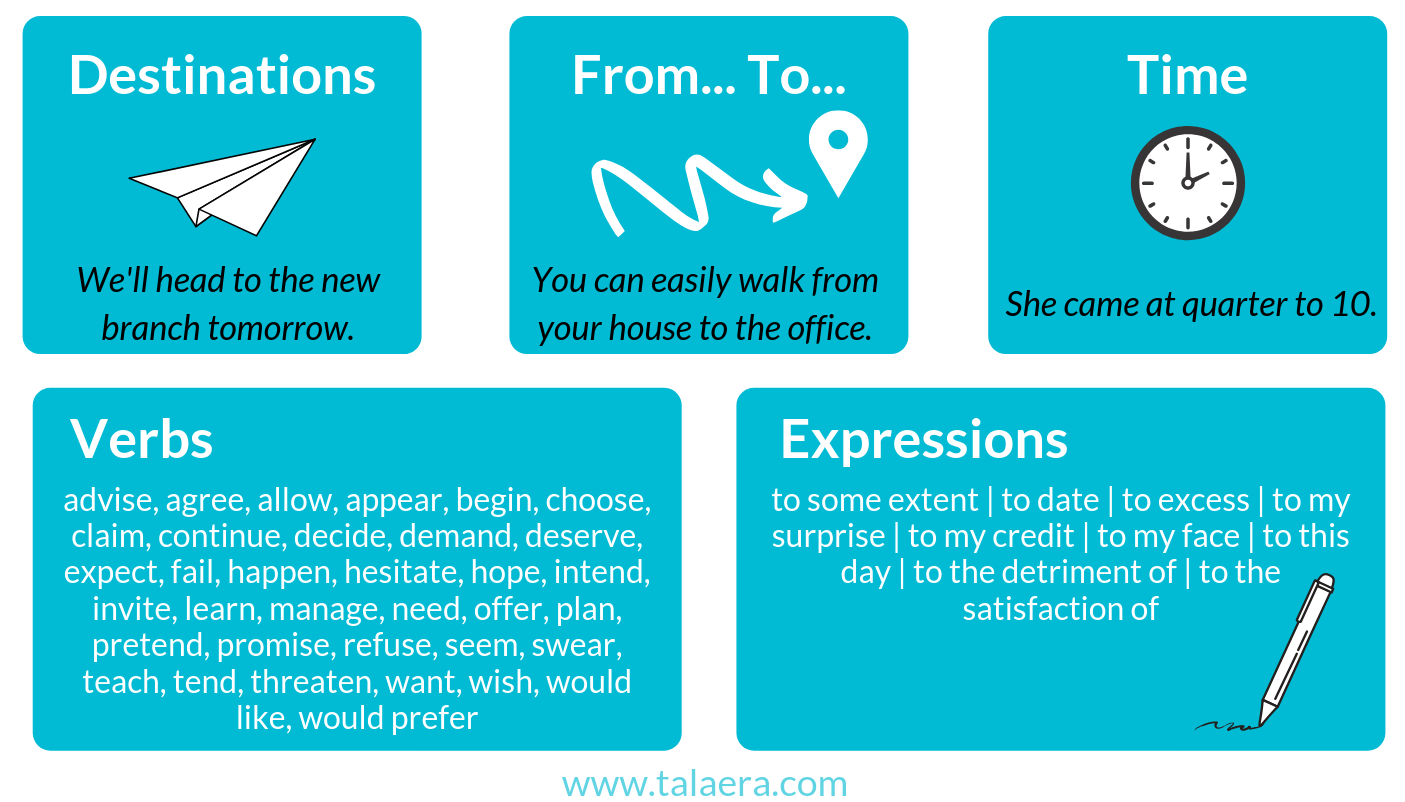
a. To indicate the destination
We use TO when we indicate the destination, and usually there is movement involved. We often use verbs such as: go to, travel to, come to, head to, mail to, send to.
- Our CEO is going to Rome tomorrow.
- We’ll head to the headquarters in a second.
- I am traveling to our branch in Bristol next month.
b. In the structure “from … to …”
- It’s about 5km from my house to the university.
- I work from 5 to 9.
c. To tell the time (usually in the UK)
In the USA, it is quite common to tell the time by saying the hour + the minutes.
Examples:
- 5:30 – It’s five thirty.
- 8:50 – It’s eight fifty.
However, especially in the UK, it is very common to express how many minutes there are left until you reach the next hour, once it is 30 minutes after o’clock.
Examples:
- 5:40 – it’s twenty to six.
- 8:50 – it’s ten to nine.
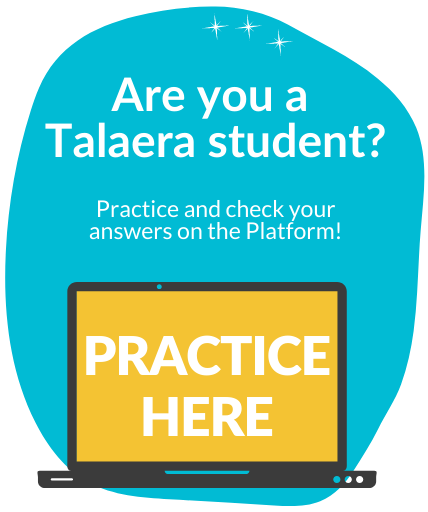

d. Use TO with the following verbs
If you are using the following verbs, you will need the preposition to:adviseI advise you to start as soon as possible.agreeAnna agreed to help me with the report.allowWe are not allowed to disclose any information.appearThe forecast appeared to be better for the next quarter.beginHe began to give his presentation a bit later than expected.chooseI chose to stay in the company.claimShe claimed to know more than the rest of the team.continueShe continued to talk.decideWe decided to go ahead with the deal..demandHe demanded to speak to Ms. Liu.deserveHe deserves to go to jail.expectWe expect you to be transparent with us.failHe failed to get enough money to pay for the new project.happenShe happened to be away during the negotiations..hesitatePlease don’t hesitate to get in touch if you have any questions.hopeI hope to live up to your expectations.intendWe intend to visit your offices next month.inviteThey invited us to visit their new office.learnI learned to speak Japanese when I was a kid.manageWe managed to raise enough money for the project.needWe need to find a better solution.offerHe offered to take on all the responsibilities.planWe plan to launch the product by the end of the year.pretendHe’s just pretending to have many offers on the table.promiseThey promised to comply with all the new regulations.refuseThey refused to adapt to our policies.seemIt seems to be a tough market.swearShe swore to tell the truth.teachShe taught me to write better emails.tendHe tends to speak too fast when he is nervous.threatenHe threatened to leave the company.wantWe want to finish this section by tomorrow.wishI wish to stay.would likeWe would like to start now.would preferI would prefer to do it on my own.
e. Use TO with the following expressions
to some extentEveryone will have to compromise to some extentto dateI wrote to him two months ago, but I haven’t received any response to date.to excessThey both spend to excess.to my surpriseto the surprise of her colleagues, she resigned.to my creditto her credit, she had never betrayed them.to my faceI can’t believe he lied to my face.to this dayThe tradition continues to this day.to the detriment ofHe puts all his time into his career, to the detriment of his personal life.to the satisfaction ofWe want to solve the problem to the satisfaction of all the employees.
3. When should you use “FOR”?
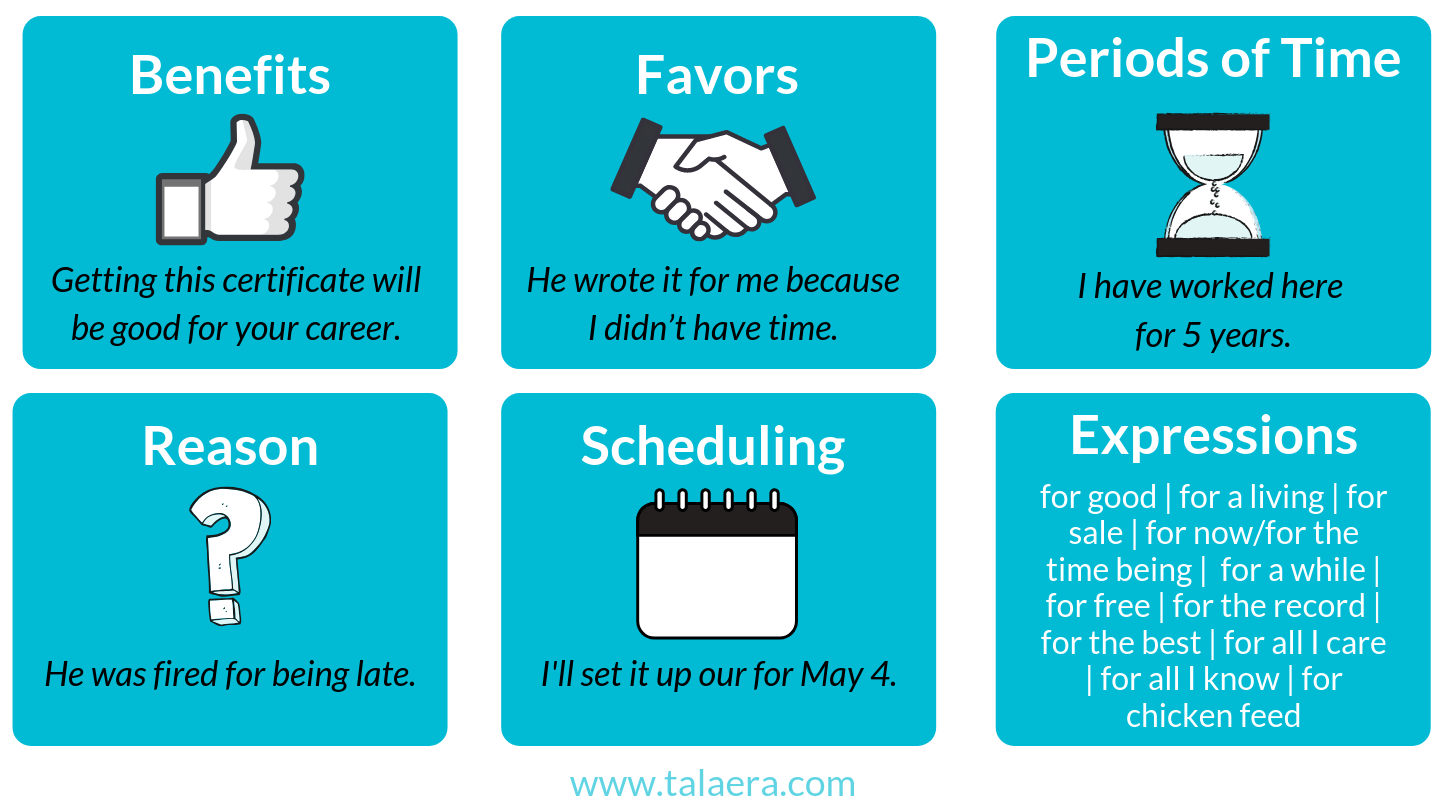
a. Expressing the benefits of something
- Getting this certificate will be good for your career.
- Fruits and vegetables are good for your health.
b. Doing a favor
- He picked up the mail for me.
- I didn’t know how to write the letter and she did it for me.
c. Giving a reason, so you can replace it with “for the reason of”
- He was fired for being late. (= He was fired for the reason of being late.)
- She was punished for disclosing important information. (= She was punished for the reason of disclosing important information.)
d. For periods of time (“for how long?”)
- I have worked here for 5 years.
- We were negotiating for 3 hours.
e. Scheduling something for the future
- I set up our interview for May 4.
- I will schedule our next session for next Tuesday.
f. Use FOR with the following expressions
for goodpermanentlyfor a livingas a professionfor saleintended to be soldfor suredefinitelyfor now/for the time beinguntil some other arrangement is madefor a whilefor a period of timefor freewith no chargefor the recordso that the true facts are recorded or knownfor the bestconsidering all the circumstances, it is the best thing that could have happenedfor this reasonthereforefor all I careI do not carefor all I knowI do not know, but it is possiblefor chicken feedfor almost no money
4. Confusing cases – TO or FOR?
We gave you some rules with lots of examples. However, there are some situations where the difference between to and for is not so clear. We’ll look at them and give some tips to make your life easier.
a. Expressing goals
If you want to express a goal, and you are using a verb, then you should use TO + infinitive verb.
- I got this certification to increase my chances of being promoted.
**Note: It is also possible to use FOR to express a goal. However, it doesn’t always work, so if you have doubts, always use TO + infinitive.
**Careful: Never use FOR + infinitive!
- I went to the office for talk with my boss. → I went to the office to talk with my boss.
b. “For you” or “To you”? People and pronouns
Should you say “I sent this letter to you” or “I sent this letter for you”? The answer is – both are possible, depending on what you mean.
- ‘I sent this letter to you’ means that, hopefully, you will receive my letter, because you are the recipient.
- ‘I sent this letter for you’ means that I did you a favor and took the letter to the mailbox, but the recipient is a third person.
So remember these two rules:
1. If there is a transfer of something to someone → TO
- Can you give this to her?
- I wrote the letter to her. (I wrote the letter and she will receive it soon)
2. If the person will benefit from a service or a favor → FOR
- This present is for him.
- I wrote the letter for her. (She wasn’t able to write it and I did it for her as a favor)
Still not clear? Get in touch with us and one of our teachers will have a one-on-one session with you to explain the differences. Keep learning grammar with this article on prepositions of time.
5. Practice exercises with solutions
Fill the blanks with TO or FOR and then check your answers here.
- I am writing an email __ find out the details.
- We’re traveling __ Singapore in two months.
- I’ll set up our next meeting __ Monday.
- They came __ the results.
- He’ll head __ the new branch in the morning.
- You’re seeing Sue at the weekend, right? Can you give this present __ her?
- There are some good points, but also many negatives, so I only agree __ some extent.
- I have to prepare a report __ the meeting.
- I think they went a bit too far, but she was fired __ being late.
- This contract is only __ ensuring that your needs are covered.
- You can use this tool __ debug the system.
- He came quite early, at quarter __ five.
- She continued __ talk.
- Sarah sent the parcel __ me because I had the flu and couldn’t go out.
- They need __ provide all their details before we sign the agreement.
- I would love __ visit you in Rome.
- He’s super sweet, he picked up the parcel __ me.
- We always have happy hour on Fridays. The tradition started 10 years ago and it continues __ this day.
- The whole team was sad about the news – apparently he left the company __ good.
- Roy hasn’t got any money so I’ll have to pay the bill ___ him.
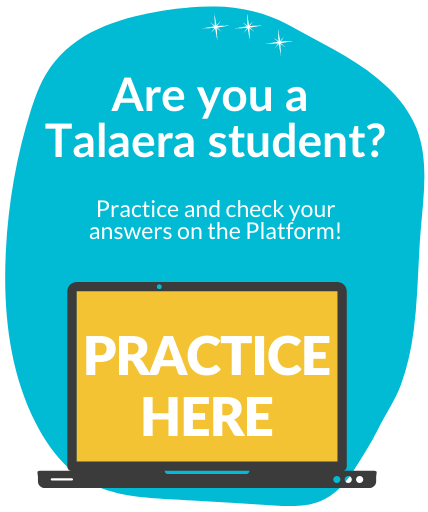

Hopefully, now you know the difference between these two prepositions, although having a teacher you can practice your grammar and speaking with is one of the most effective ways of learning a language. If you are interested in trying our online Business English training, you can do it for free. Get in touch!
Keep Improving Your Business English
Continue improving your communication skills for professional situations with our free resources. If you are serious about improving your business English skills, get in touch with Talaera. We will help you take your professional English communication skills to the next level.

For any additional information or questions, you can also reach out at hello@talaera.com. Interested in getting the best offers and receiving free content on Business English communication? Subscribe to our newsletter and we will keep you in the loop with offers, free events, and development materials!
If you enjoyed this article, keep reading:
- The 30 Business English Idioms You Absolutely Need
- 12 Perfect Success Idioms To Show Off At Work
- 8 Helpful Idioms About Solving Problems For Every Situation [Podcast]
- Your New 6 Idioms About Problems [Podcast]
- Problems at Work? Learn These 18 Idioms About Challenges
- Top 11 Idioms About Talking To Show Off At Work
- 30 Must-Know Idioms About Negotiations & Agreements
- Once In A Blue Moon… And Other Great Time Idioms
- Top Money Idioms You Need… At All Costs
- 8 Top English Idioms for Successful First Steps! [Podcast]
- Are you Super Busy? Use These 8 English Idioms! [Podcast]
- 10 Helpful Decision Making Phrases [Podcast]





